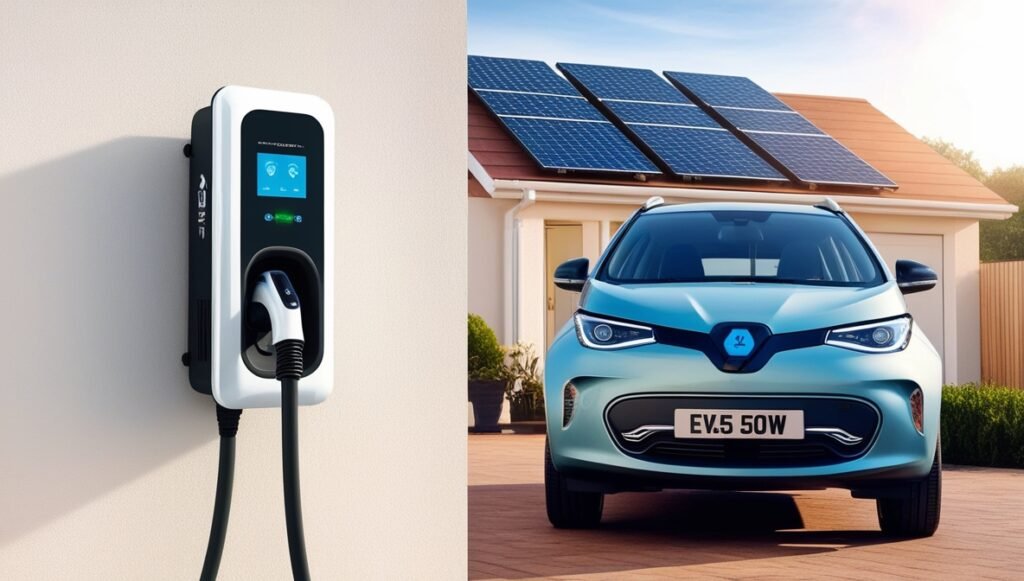Are you transitioning to an electric vehicle (EV) in the UK? With increasing environmental awareness and rising petrol prices, owning an EV is a wise move. However, choosing the right home EV charger UK is essential for maximizing your EV experience. This guide provides the most up-to-date information, backed by expert insights, user testimonials, and the latest data, ensuring you make the best decision.
Why You Need a Home EV Charger
- Cost Efficiency: “Charging at home can reduce costs by up to 60% compared to public stations,” says Dr. Emily Benson, green tech analyst. According to the UK Department for Transport, the average home charging cost is £0.28 per kWh, compared to £0.50 at public stations.
- Convenience: “Having a home EV charger UK means you can wake up to a fully charged vehicle every day,” says Mark Thompson, automotive expert. London-based user Paul M. shared, “I used to struggle finding public chargers; now, I never worry about range anxiety.”
- Property Value Increase: Properties with home EV chargers UK are 5% more likely to sell faster at a premium, according to the Energy Saving Trust.
- Faster Charging: Home chargers can provide up to 7kW of power compared to 2.3kW from a standard socket, significantly reducing charging time.
Understanding EV Charging Levels
- Level 1 Charging: Uses standard 120V outlets, taking up to 24 hours for a full charge.
- Level 2 Charging: Ideal for home EV charger UK setups, utilizing a 240V system to charge an EV in 4-8 hours.
- Level 3 Charging (DC Fast Charging): The fastest option available, providing up to 150kW, mainly used in commercial stations due to its power demands.
Types of Home EV Chargers
- Portable Chargers: Great for flexibility, especially for renters or those with multiple residences in the UK.
- Wall-Mounted Chargers: “Perfect for homeowners seeking a permanent and efficient solution,” says Sarah Evans, a professional installer specializing in home EV charger UK setups.
- Charging Stations: These advanced units feature Wi-Fi connectivity and energy monitoring. “Smart chargers not only provide efficient charging but also help manage energy usage, essential for both cost savings and environmental impact,” explains Thompson.
Top Home EV Chargers in the UK – A Comparative Analysis
| Charger | Type | Charging Speed | Price Range | Key Features |
|---|---|---|---|---|
| Pod Point Solo 3 | Wall-Mounted | Up to 7kW | £449 – £599 | Plug and play, Wi-Fi enabled, remote control |
| Andersen A2 | Wall-Mounted | Up to 22kW | £1,099 – £1,249 | Sleek design, customizable colors, hidden cables |
| EO Mini Pro 2 | Wall-Mounted | Up to 7.4kW | £495 – £695 | Compact size, smart app control, remote management |
| Myenergi Zappi 2 | Wall-Mounted | Up to 22kW | £855 – £1,055 | Solar integration, eco-smart tech, programmable timer |
| Tesla Wall Connector | Wall-Mounted | Up to 11.5kW | £499 – £699 | Optimized for Tesla, fast charging, Wi-Fi updates |
Note: Prices vary based on retailer and installation costs.
Installation and Safety Considerations
Professional installation is recommended for all wall-mounted and charging station units to ensure safety and compliance with UK regulations. This may include upgrading your home’s electrical panel to support the increased power load for home EV chargers UK.
Government Incentives and Grants
The UK government’s Electric Vehicle Homecharge Scheme (EVHS) provides up to £350 towards installation costs for eligible homeowners. Rolec Services, for example, has leveraged this scheme, increasing their home EV charger installations by 30%.
Troubleshooting and Maintenance
- Common Issues: If your home EV charger UK isn’t working, check the power supply and circuit breaker. For slow charging, verify charger settings and inspect for external factors.
- Maintenance Tips: Clean connectors, check for damage, and update software regularly. Sarah Evans suggests, “Routine maintenance every six months can prevent 90% of common issues.”
Interesting Facts About EV Charging in the UK
- Charging Device Growth: The UK has seen EV charging devices rise from 25,927 in October 2021 to 53,677 in January 2024.
- Regional Disparities: London leads with 210 charging points per 100,000 people, while Northern Ireland has only 24 per 100,000.
- Cost Differences: Public fast charging costs average 56p per kWh, while ultra-rapid chargers are around 80p. Home charging remains the most economical at approximately 28p per kWh.
EV Charger Comparison UK (2024)
Top Chargers Comparison
Explore leading EV chargers, including Pod Point Solo, Andersen A2, and others, with detailed features and prices.
Charging Speed Analysis
Compare charging speeds: Level 1 (24h+), Level 2 (4-8h), and Level 3 (30 mins) with a visual graph.
Government Grants Flowchart
Understand the steps to apply for the EVHS scheme, including eligibility and application guidelines.
Regional Charging Distribution
Visual map displaying charging points per 100,000 people across different UK regions.

